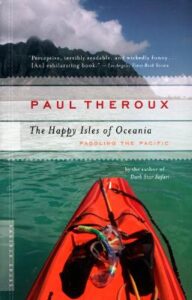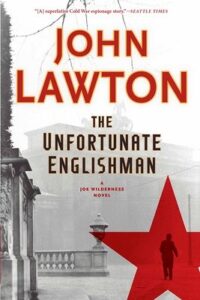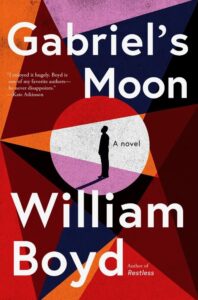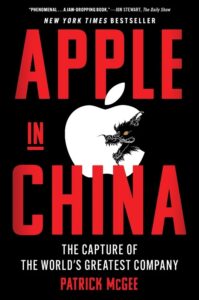
The Happy Isles of Oceania – Paul Theroux
The latest re-read – for the fifth, sixth time? – of my all time favorite, non-fiction book. I actually meant to take it when we traveled to Hawaii four years ago but couldn’t find it. It turned up a year or two later and has been sitting on my shelf, waiting for the right moment. I decided I will continue to read it once every ten years or so as long as I am able.
As with each return to it, I’m fascinated by the changes in the world from when Theroux paddled through the Pacific in the very early 1990s. Shortwave radio is dead, so that could no longer be his lifeline to the world. Surely if he repeated the trip today, he would have a device of some kind that had a satellite connection on it, even if just for emergency purposes. I wonder how much his various destinations have changed, and in what ways they have not. How many of the people he talked with are still alive.
I used to dream of making a similar adventure. That was always an extreme stretch, but at my age it seems even more unlikely. I finally made it to Hawaii in 2021. Maybe I’ll find my way to a few of the other islands Theroux visited at some point.

The Unfortunate Englishman – John Lawton
Book two in Lawton’s Joe Wilderness series. This one mostly takes place right around the time the Soviets are putting up the Berlin Wall and involves more back-and-forth between East and West by agents of both sides. To be honest, I read the next book in my list too quickly after this one and they kind of ran together. Another failure on my part to take the proper notes while reading.

Gabriel’s Moon – William Boyd
As with The Unfortunate Englishman, this takes place in the early 1960s. In this case, Gabriel Dax is an English travel writer who stumbles into one of the biggest moments of the Cold War and, as a result, gets sucked into the world of espionage. His minor role ends up becoming extremely important on two different fronts of the Cold War.
What I liked most about this was that Boyd wrote it in a style that very much fit its age. It felt a little like one of Ian Fleming’s Bond novels, although perhaps not as glamorous nor violent. Like Bond, Dax is a bachelor. He also enjoys fine foods, drink, cigarettes, and ladies. But as he’s not officially on Her Majesty’s payroll, everything is stepped down a few levels from what 007 experienced. I’m not sure how close it came to how an Englishman would actually live in the Sixties, but it seemed right to my brain.

Apple In China – Patrick McGee
A fascinating book that got a lot of attention in the tech world when released earlier this year. It traces Apple’s history, focusing most on the second Steve Jobs era, when the iMac, iPod, and iPhone brought the company from the verge of bankruptcy to the most valuable in the world. Along the way Apple became more and more reliant upon China for manufacturing those products. When Xi Jingping assumed power, and turned the country into an autocracy, Apple was suddenly beholden to him if they hoped to remain as the leader in their space.[1]
This is an important read because Apple is not the only company in such a position. If China somehow crippled Apple tomorrow, it would suck, but we could all go buy phones and laptops made in Korea or other non-Chinese markets and carry on. But if China ever takes out Taiwan, or cuts off their own chip manufacturing complex, it would have much more dramatic effects on the world economy. And the book is a good explainer/reminder that it is wildly unrealistic and unserious to insist that we need to make iPhones, etc in the US and think it will happen. But we live in unserious times…
- And now also beholden to another autocrat here in the US. ↩